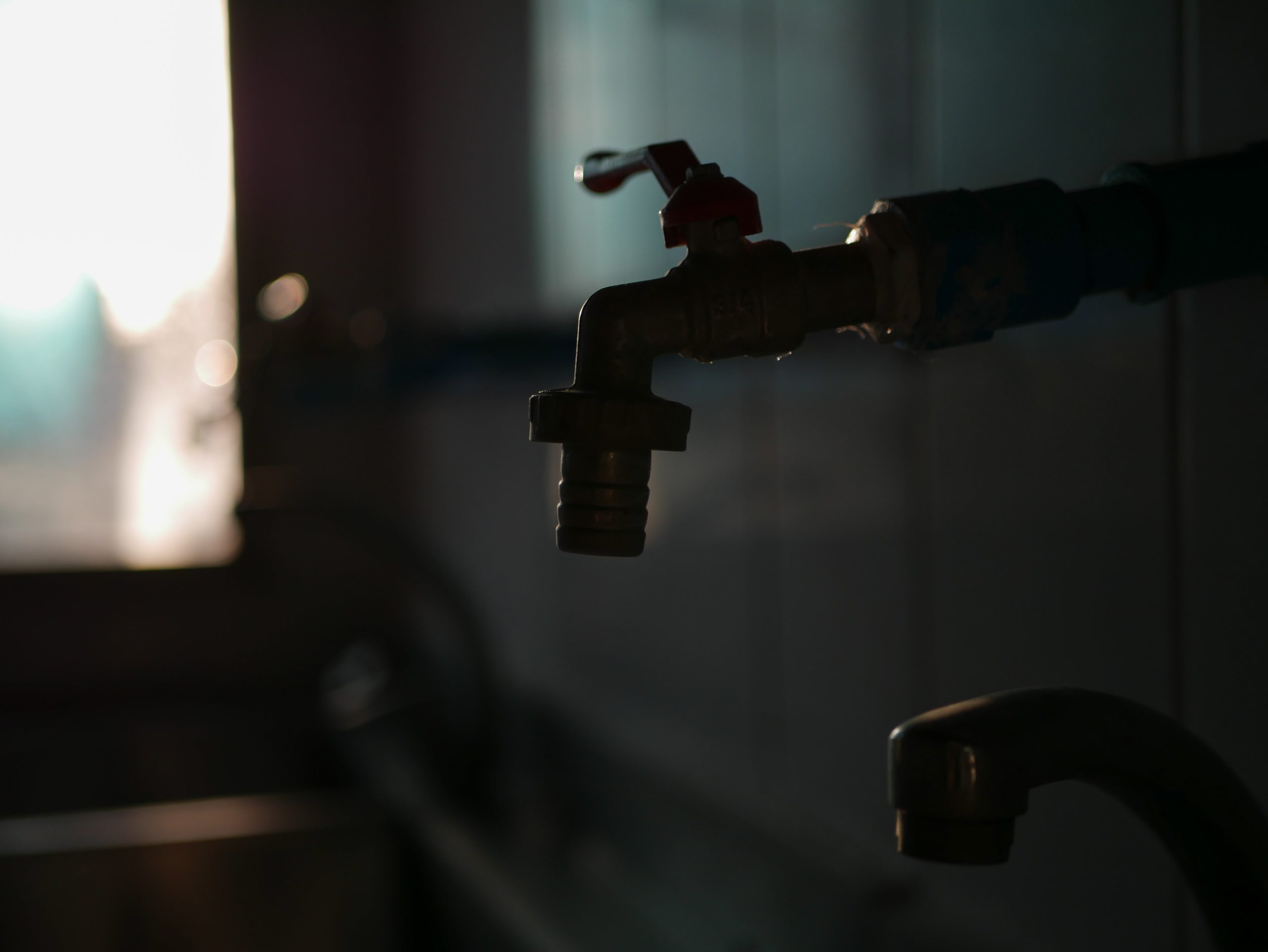There was a time I thought a great deal about our sink faucet. It was a sorry little thing—rusted in some places, stained in others. It sat in the space opposite our kitchen—the washbasin once white, now brown. It’d been touched with hands smeared with curry or paint or snot—and each interaction had left its scar, marked it in a way that was repulsive and pitiful. At one point the handle had gotten so dirty we started to grip it with a rag cloth when we washed our hands. No one wanted to be the one to do the gripping.
After meals, we schemed to get to the washbasin so we wouldn’t have to touch it—the rule was that if you reached the faucet first, you had to open it; if you reached it last, you had to close it. So all of us wanted to reach the faucet sometime between, which was a far more complicated affair than it seemed. I spent all night thinking how I could place myself after breakfast so I got there quick enough to be among the firsts but not the first. But on several such occasions, I would get bullied into going last. One of my brothers would tackle me to the ground and hold me there by pressing his foot into my crotch—and the ones who’d already washed their hands would crowd around me, pinning my hands and feet to the floor so I couldn’t squirm away. This was the other rule, the unspoken one—if you’d washed your hands, you pounced on the weakest. I let out one long howl, then screamed and spat in the direction of his foot, clawing at his heel with my nails, but I only had seconds before I was pinned down again. Father watched from the dining table, leaning forward slightly, his eyes sharp like this was a cricket match. The brother whose foot had now burnt deep into my groin laughed as he washed his hands, then sauntered away after one more hard shove, taking the rest of the mob with him. The faucet screamed for me, hissing out a thin rivulet of its spit. I timed my breath to its sputtering so I wouldn’t forget to breathe. The entire lower half of my body was on fire. The water pooled in the washbasin. One sputter, two sputter. When I finally limped up to close the faucet, I found the rag was as dirty as the handle itself. So, using the tip of my nail, I pushed the handle back. The faucet spat a last gush of water before it trickled down to a dribble, then nothing.
#
I didn’t care that the faucet had been in the family for generations, which is what Father told me when I asked him to replace it. It was fitting, I thought, that all that was left of our ancestry was this filthy, fractured, near-unusable object, hoarding sewage and sentiment. I didn’t say this to Father, of course. His fists were loose and my bones were brittle and my brothers would do nothing but laugh when my teeth caved in. As it was, I’d lost four teeth—three in the upper row, one in the bottom. All that was left of the teeth were shadowy stumps. I worried these stumps so often with my tongue that it was perpetually covered with cuts from their sharp edges. So I never said a word to Father except to scream, but I thought it each time I washed my hands. I glared at the faucet, daring it to break down. It never did.
Father had this obsession with dirt—like being a man was synonymous with having an abnormal resistance for fifth. He didn’t even wash his hands after meals, only wiped them on his pants. I made the mistake once of cleaning up the house when he was out. He rarely went out, except to pay his respects to the graves of his parents and his grandparents and their grandparents and their grandparents, all of whom were buried in our backyard. In these instances, he could be gone for hours every day. If I tiptoed out of the house and sneaked a glance from behind the staircase, I’d see him there, eyes closed, saying his prayers beside the weed-covered graves. It was the most peaceful I’d ever seen him. The midday sun haloed his figure with light. In that instant I loved this man as I’d never loved him before—I stood there captivated by my own ability to love, to want. So, to please him, I snuck back into the house and started cleaning the house, wiping down the furniture with a wet cloth, sweeping and mopping the floors till they shone. It was during this cleaning spree that I discovered the dripping. I’d been cleaning the sink faucet—or trying to, or thinking about cleaning the sink faucet and choking down bile—when I heard it. I don’t remember when it started, or whether it even started, but there it was—this drip drip drip like a clock ticking, so smooth and constant you had to strain to hear it. I was armed with a wad of paper that I used as a glove—I opened the faucet and closed it, looking for the leaking water, knowing I’d never find it. It was constant and relentless. It never skipped a beat or changed its rhythm. I was still trying to make out where it was coming from when his fist pulled on my hair and his other hand struck my left eye. I hadn’t even seen him come in. And then he spent the rest of the day and the night by the graves, turning in his sleep with the corpses. To this day, a scar above my left eyebrow marks the spot where his ring slashed my flesh. It’s the closest thing we have to affection.
For whatever reason, the scar made me more acceptable to my brothers. It was a rite of passage, I suppose—an initiation of sorts into the violence of our adulthood. They started to treat me with more respect—if I got to the faucet second, they didn’t pounce on me or hold me down or grind their shoes into my groin. I could wash my hands in peace. But I was no longer concerned with such trivialities. Something far more serious had captured my attention. All day, all night I listened for the dripping. I recorded the sounds but they never turned up on tape. I couldn’t bear it if anyone touched the faucet, so I made it clear they weren’t to approach unless I gave them permission. Of course, my brothers laughed at first, but they weren’t laughing when I slit their knuckles with a knife while they were sleeping. They stayed away after that, washed their hands with their own spit, but I knew they thought I was crazy—none of them could hear the dripping, none of them could see what I was seeing. I even dragged my newest brother to the faucet, pushed his ear to the sink, and held him down until he trembled slightly and sobbed without a sound. Don’t you hear it? I asked. Tell me you hear it, don’t you? Answer me— and when he sobbed louder, his weakness annoyed me so much I shoved him back onto the sink. His forehead hit the side of the washbasin with a resounding clang, a thin stream of blood weeping from his body into the drain. I pulled him by the hair and pushed him onto the floor, where he lay whimpering. You don’t deserve to bleed into this sink, I told him. You don’t deserve this blood. He whimpered some more. Now that I think about it, I never saw him again.
Many strange things happened that year. Father was increasingly drawn in by bursts of prayer—he’d collapse mid-way through a meal and start chanting feverishly. After a few minutes of this, he’d limp to the backyard and spend the rest of the day there. Each second he spent away from the graves drained him. It made him weak and sluggish—soon, he seeped away from the house like a disease and moved in with the corpses. We took his meals to him each day to keep him alive—but we were relieved when he showed no sign of moving back in. In his absence, we could all do whatever we liked. Some of my brothers brought in girls, others brought in weed, others still killed themselves and left suicide notes about how they were ready to return to the Fathers. It infuriated us. All of us were ready—we’d been ready since we’d gotten here. We’d been waiting since we got here—and what made them think they had the right to cut the line and enter first? So we didn’t bury them. In spite, we let their bodies rot in the house, and with each day, it became more and more repulsive to take them out. The smell enveloped me like a dress. It drove the others out, and they started to move in with their friends or their girlfriends, returning only for meals. As for me, I clung to my faucet. I had no other choice, but would have chosen nothing else. I worshipped it—trained my ears to track the slightest changes in the dripping. Each drip held a different pitch to it—a variation in depth and tremor. Once I noticed this, I was obsessed with tracking them, seeing if they made patterns or codes. This was a task that was near-impossible, considering there was no way of recording the sounds or making them last long enough to figure out their exact pitch and tremor. Even so, I kept trying. It felt wrong to stop now—like a betrayal. I kept my spreadsheets and made pages and pages of incoherent notes. The dripping never stopped—not even in my dreams. I was afraid of it sometimes—especially when it got so loud I couldn’t hear anyone when they spoke. When this happened, I was forced to stammer through my answers, say them again and again, since I couldn’t even hear myself speak. I started saying the same things thrice, four times—and the only way I knew I was doing this was when my brothers exchanged strange glances, some laughter. This only enraged me more, so I lashed out at them, my fist stained with the blood that the faucet later cleansed with its spit. They learnt to stay away, leave me to my dripping.
There were short periods of relatively quieter dripping—dripping so soft it was more of an echo, a warning of an echo, a threat of a warning. But I had only to think of it and it was back at full force again—so loud I clapped my hands over my ears and ran screaming to the sink, raining blows on the metal with a hammer until my hands were raw and bloody. The faucet was always untouched. In the dark, it winked at me—teeth glinting.
I knew now that things were always more than what they seemed to be. I stood myself in front of the faucet—asked for its name, its rage. I bent over it, kissing the part where the handles met. The dripping seemed to grow softer in these instances—and clearer too. If I stood very still, I could make out the edges of some words—the hiss of an s, the nasal dip of an n. The voices hummed and hummed till they made words, till they made sentences—then a limb, an eye, two fingers, a body. I took to standing in front of the faucet all day—speaking in soft, soothing tones to it. I drank from it, pressing my mouth to its edge so that it could gush its water into me. It washed me in and out. It blurred the dripping so close and low it was like a hiss—like the rush of blood.
And oh—I was happy then. I was happier than I’d ever been, than I’d ever been given reason to be. Father was a ghost, and my brothers had all filed out of the house. Some were dead, some were in jail. Some sold the weed, some wed the girls they brought in, some had children. For the first time in our ancestry, this house didn’t hold all the men of the family. And did I resent this? Did I miss them? Perhaps I did, but only as you’d miss a seeping wound you could no longer claw your nails into. Occasionally, the scar above my left eyebrow would ache, and I would think of that moment in the sun—how I loved Father then. I would think of that desire surging through me and gasping, I’d empty my seed into the sink. It drank up every single drop, left nothing behind. The faucet hummed approvingly.
It was one such occasion that the horror began. My eyes were closed, my head thrown back, and in the throes of my ecstasy, I heard the choked breath, the phlegm catching air and holding it in the throat. He could hardly speak—his voice was thick and blurred as if he was talking through mud. I never replied, never took my eyes off the sink. I had acquired a strange, tender intimacy with the dripping, the voices. I wasn’t about to ruin it. Father looked at me like I was an animal, worse than an animal—like I was a piece of rotting flesh or spoilt milk. He was shaking so hard I thought the house would quiver along with him, and it was only when I touched the sink that I noticed I was trembling too. That night—or day, I could hardly tell—he swept through the house, depositing the corpses of my brothers in the street. In decay, their flesh collapsed into each other, a single body. The next morning, he took a saw to the faucet. The faucet was hardly dented. It hung over the sink like an animal, like a cock, long and lovely. When all his raging didn’t work, he took the saw to me. His face was calm and untroubled. You’ve ruined us, he said. You’ve ruined us. I didn’t doubt for a second he’d do it. I stood by my faucet, closed my eyes. When the dripping was loudest, I knew exactly what I had to do. It happened in an instant, but I could feel something break in me—a tie that’d been interrupting my connection with the dripping, an interference. Everything, everything was clearer now. Blood bathed the sink, my body—inside and out.
Weeks passed without interruption. I worshipped the faucet with my mouth, gave myself to the dripping. I could feel the bones of my ribs straining through my chest—as if they’d climb out at any instant and be on their way. My teeth were crumbling on my tongue like sandcastles.
My fingers were pink and long, without nails to end them. My sight puckered with my breath, my blood clenched like a dead child. All I could hear was the dripping—all I knew was the dripping. When I couldn’t stand anymore, I collapsed. It was clearer now. So clear I could make out those words—keep them safe and still on my lips. Look at you, they were saying. They smoothed my hair back, kissed my eyelids. You’ve given so much for this, given so much. Look how far you’ve come. Look how we stand here, a body.




